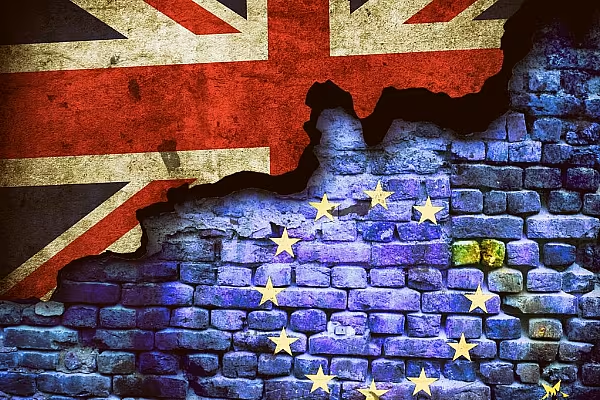The European Union may get a preview of the impact Brexit will have on its bottom line when EU governments tackle the bloc’s budget this week. And it risks being unsettling.
Battles over EU spending, which is funded mainly by national transfers, traditionally say more about the politics of Europe than about its economy. That’s because the European budget, while limited to 1 percent of EU gross domestic product, is increasingly viewed by member countries in an era of populist backlashes through the prism of net contributions and receipts.
Germany, Sweden and Denmark warned in recent closed-door deliberations about the extra constraints that the U.K.’s planned departure from the EU will place on the European budget, highlighting the matter as a topic of concern, according to a national diplomat involved in the talks, who asked not to be identified because the discussions are private.
Ministerial meetings in Brussels on Tuesday and Wednesday will tie together two EU budget issues that, in the run-up to Brexit negotiations, could reveal a degree of U.K. leverage over the bloc and future tensions among the other 27 member countries.
The U.K. has been a net contributor to the EU budget, averaging an annual payment of 7.6 billion euros ($8.3 billion) over the past five years after a rebate negotiated by Margaret Thatcher in the 1980s.
EU expenditure is about 140 billion euros annually and is fixed in seven-year cycles known as the Multiannual Financial Framework, which national leaders set after a traditional summit clash over everything from farm subsidies to research aid. The current MFF covers 2014-2020 and, following insistence by former British Prime Minister David Cameron, marks the first shrinking of the multiannual EU budget program.
Germany, the largest net contributor to the European budget, has flagged the challenges ahead by citing a “very common approach” with the U.K., the No. 2 contributor.
“We want to have priorities within the EU budget, not just more and more money for the same stuff,” German Deputy Finance Minister Jens Spahn said in a Nov. 8 Bloomberg Television interview. “If the U.K. is on the leave now and is no more a contributor to the EU budget, it’s not just about who else is now jumping in, giving the money that is not there anymore.”
The gathering on Tuesday will involve deliberations by EU general-affairs ministers about a mid-term review of the current MFF. The European Commission, the bloc’s executive arm, has proposed 11 billion euros in spending adjustments in 2017-2020. The aim is to bolster initiatives aimed at countering the refugee crisis, fighting youth unemployment and expanding infrastructure investment.
‘Budget Uncertainty’
While the changes would occur within the existing MFF ceiling, some EU capitals are signaling resistance as they gear up for Brexit talks that Irish Prime Minister Enda Kenny has said may be “quite vicious.” Denmark, another net contributor to the European budget, is among the opponents of the proposed MFF shifts.
“In light of the considerable budget uncertainty associated with Brexit, the government finds it unsuitable to make such substantial changes to the EU fiscal framework at this point,” Danish Finance Minister Claus Hjort Frederiksen told members of the country’s parliament last week. He said the EU will be poorer after the U.K.’s departure and, as a result, the bloc will have less budget leeway.
On Wednesday, EU budget ministers will haggle over the draft 2017 spending plan, which faces its own set of adjustments including an extra 1.8 billion euros for migration.
Corridor Diplomacy
Resistance here is likely to come from the European Parliament, which wants to link a deal on next year’s spending plan with the MFF review.
The maneuver by the EU Parliament amounts to a power grab. While having the same right as governments to amend the bloc’s annual budget, the EU assembly can merely grant or withhold final consent on the MFF review.
The meeting of EU ministers on Wednesday will morph at around noon into deliberations with budget negotiators from the 751-seat Parliament and then into a series of discussions among smaller groups of huddled experts in the sprawling building where European summits are held. The annual ritual is often a late-night affair.
While nobody can predict when the haggling and corridor diplomacy will end this time, one thing is for sure: the prospect of Brexit has increased the number of national politicians echoing Thatcher’s money-back demand and threatening to worsen Europe’s budget battles.
News by Bloomberg, edited by ESM. To subscribe to ESM: The European Supermarket Magazine, click here.














